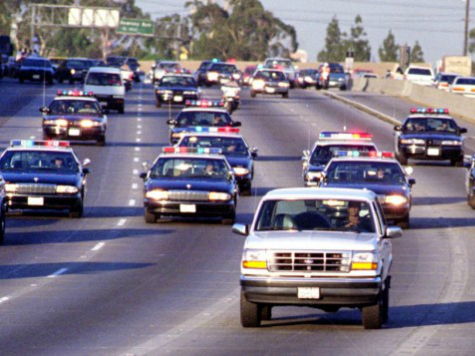
Twenty years ago today, the United States Marine Corps saved me from O.J. Simpson.
O.J. didn’t try to knife me or steal back his trophies. Like Tonya Harding, Rob Lowe, and Pee Wee Herman before him, O.J. attempted to steal my brain by unwittingly transforming television into a pixelated version of the National Enquirer. Whereas the others had failed in that ignoble effort, the Heisman Trophy winner succeeded. Post-O.J., every news program not actively seeking not to become Hardcopyacurrentaffairentertainmenttonight became Hardcopyacurrentaffairentertainmenttonight. Even sports highlight shows became sports gossip shows. Orenthal James Simpson killed the news (and sports) soon after he killed Ron and Nicole.
O.J., A.C., and the white Bronco doesn’t register with me because they occurred beyond my notice. As millions of eyes transfixed on a police pursuit playing on their television sets, mine locked forward in a squad bay in Parris Island, South Carolina. It’s tough to think about that mosquito making dinner of your elbow, let alone O.J. Simpson, when a large drill instructor screams in your face.
I spent the summer of 1994 becoming a Marine on a swampy South Carolina island heavily populated with sand fleas but, at least from the recruit’s perspective, completely devoid of television sets, telephones, and other communications mechanisms. We wrote letters, and if the people at the other end liked us, they wrote back. If email and text messages had been invented, nobody in my platoon had heard of them.
But I had heard of O.J. Simpson, and so had my 77 fellow recruits. Before the postman would tell us otherwise, we knew from our senior drill instructor that O.J. Simpson and his homosexual lover had killed his wife after she caught them in flagrante delicto. The unambiguously gay duo had been leading the police on a high-speed chase throughout Southern California.
The shocking information sparked a game of operator, in which word-of-mouth twisted the initial off-base report into an even wilder tale. An inherently surreal event took on an even more outlandish quality on a surreal island of cracked-over World War II era landing strips, oversized adult sand-boxes, black-flag days, and inhabitants eerily sporting the same haircut, fashion sense, and ugly brown glasses.
Just few days prior to receiving the O.J. news, I, along with guys from everywhere east of the Mississippi, had stepped off a bus and onto yellow footprints. After being kept awake for a night in receiving, we received no respite in bed from the onslaught of the unusual: a powerful South Carolina thunderstorm, a random recruit’s tear-filled night terror, and visions of an imposing drill instructor bearing massive facial scars gained during the Beirut bombing kept us awake again. So, news a few days later that one of the greatest running backs in football history had murdered two people meshed perfectly with the normal of abnormality on the island. Fatigued in our fatigues, we would believe just about anything.
The bizarre version of the murder case told to us unraveled over the course of about a week. In formation outside the chow hall, a recruit, if careful enough, could glean headlines from behind the plexiglass of a newspaper stand. Several days after the June 17, 1994 chase, recruits received letters accurately detailing the case against the former Buffalo Bills running back, Hertz pitchman, and Naked Gun punchline. Relief overcame several don’t-ask-don’t-tell-era recruits upon discovering that O.J. was one-hundred-percent heterosexual just as they had always assumed. Phew!
Simpson quickly faded into oblivion that summer. Throwing a hand grenade, scaling a thirty-foot-high ladder, firing various machine guns, and exploring the culinary diversity within a box of MREs captivated in a way that the murder case never did. Even as a news story, the impending baseball strike occupied my thoughts more than O.J. Simpson. As a Fenway Park vendor looking forward to returning to carting hot dogs up endless bleacher stairs during summer’s dog days, missives detailing an August labor stoppage surely read more cruelly than any “Dear John” letter received by my fellow recruits. After seven years at Fenway, I had sold my last $2 hot dog.
Cultural commentators call the slow-speed police chase on the 405 a national common denominator like 9/11, that little girl falling down the well, and the Space Shuttle exploding. But my memory bank of the event remains thankfully empty. So, there’s a logical gap unbridged in my brain of how America got from then to now. Pre-O.J., you couldn’t escape the checkout aisle in the supermarket. Post-O.J., you couldn’t escape the checkout aisle in your living room.
O.J. happened to Ron and Nicole. Then he happened to America. We can lock him in jail. But he breaks out as Monica Lewinsky, Gary Condit, Jon and Kate and their Eight, Rod Blagojevich, Janet Jackson at the Super Bowl, and a thousand other characters we don’t want to remember but cannot forget.
In the summer of 1994 (like the summer of 2014), the place to stay sane remained far away from a television set. The Marine Corps wiped the Ford Bronco car chase clean from my brain housing group. I can’t thank them enough.

COMMENTS
Please let us know if you're having issues with commenting.